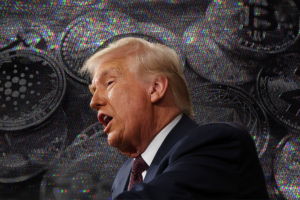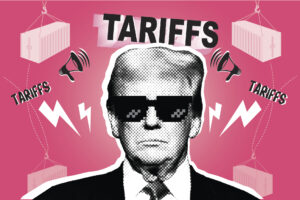The Belly Flop of Trumpism Without Trump
The recoiling reaction to JD Vance and Project 2025 does not bode well for the MAGA movement when its leader passes from the scene. Republican presidential candidate Donald Trump speaks at a campaign rally in Charlotte, N.C., in July. (AP Photo/Alex Brandon)
Republican presidential candidate Donald Trump speaks at a campaign rally in Charlotte, N.C., in July. (AP Photo/Alex Brandon)
In early July, Donald Trump took to Truth Social to denounce Project 2025, the 920-page policy blueprint that had become a source of steady bad press for his campaign. After getting battered by Democrats for his well-documented ties to the initiative, the former president decided to finally speak out publicly and, he hoped, put an end to the Project 2025 discourse. “I know nothing about Project 2025,” he said, while describing some of its proposals as “absolutely ridiculous and abysmal” and claiming to have “no idea who is behind it.”
Trump did not specify in his post what he found “abysmal” or “ridiculous” about Project 2025. In private, he has reportedly complained about the extreme abortion policy proposals laid out in the Heritage Foundation-scripted plan for the next Republican administration. According to Rolling Stone, the Republican candidate fumed that the “lunatics” in charge of the project could cost him the election, or at least narrow his sizable lead. Over the next month, the campaign continued to claim zero association with Project 2025 and other hard-right groups and ideas. At a mid-July rally, Trump slammed the “severe right” and described those involved with Project 2025 as “seriously extreme.”
Several polls show that Trump has good reason to be worried about Project 2025 dragging down his campaign. In late July, the polling consortium Navigator Research released surveys showing that more than half of Americans had heard of Project 2025. Of these respondents, just 11 percent viewed the project positively, compared to 43 percent who had a negative view. The polling group also found that overwhelming majorities opposed specific policies such as employing the federal government to “surveillance” abortions, abolishing the Department of Education and allowing the president to fire thousands of civil servants in the federal government.
Of these respondents, just 11 percent viewed the project positively, compared to 43 percent who had a negative view.
Last week, two surveys from YouGov — conducted for the University of Massachusetts and the Economist — offered further evidence of the broad opposition to many of Project 2025’s central planks. They found that overwhelming majorities reject policies such as purging career government employees and installing loyalists to the president in their place (negative 56 percent net support), “restricting women’s access to contraception” (negative 62 percent net support) and abolishing the Department of Education (negative 44 percent net support). The YouGov polls also showed a growing awareness of Project 2025, thanks no doubt to its constant reference by Democrats. About three-quarters of Americans have now heard at least something about the right-wing project, and only 15 percent have a favorable opinion of it.
Unfortunately for the Trump campaign, these polls also indicate that few people have accepted the former president’s public disavowals. Despite Trump’s continued effort to wash his hands of the project, only 11 percent of respondents said they believe he does “not at all” support the policies laid out in its blueprint.
Those involved with Project 2025, meanwhile, have expressed skepticism about Trump’s repudiation. “Trump can try to distance himself from this, but 70 percent to 80 percent of the people who wrote the book are going to be in his second administration,” a Project 2025 contributor told Rolling Stone. “You can’t look at this constellation of organizations and people without seeing that they’re all his people,” they continued.
Beyond the obvious fact that Project 2025 is essentially an employment program for ex-Trump officials, another glaring problem has arisen for the Trump since he denounced the operation over a month ago. If Trump wants to disassociate his campaign from the more extreme elements on the American right, he made a colossal strategic blunder in choosing JD Vance as his running mate.
Out of all the potential vice presidents Trump could have selected, none came with as many ties to the “lunatic” fringe as Mr. Vance. Over the past few years, the Ohio senator has been deeply involved with the project to create a more intellectual, more ideologically coherent Trumpism. This effort has led to some pretty interesting affiliations.
Vance is like the Forrest Gump of the far-right, showing up everywhere that reactionaries congregate to discuss radical plans for the next Republican administration. He is friends with various “postliberal” figures who reject the liberal paradigm and its focus on “progress” and “human rights,” and who instead point to Viktor Orbán’s Hungary as a model worth emulating. He has favorably cited the “neo-reactionary” blogger Curtis Yarvin, an associate of Peter Thiel who advocates installing a CEO-like dictator who would crush the “deep state” and establish a new techno-monarchy in America. He has also been a regular guest on Steve Bannon’s “War Room” and made appearances on even more fringe podcasts, such as “Jack Murphy Live,” hosted by a manosphere activist who once wrote that feminists “need rape.”
Vance is like the Forrest Gump of the far-right, showing up everywhere that reactionaries congregate to discuss radical plans for the next Republican administration.
In addition to the podcast circuit, Vance has also been a regular presence at conservative conferences hosted by hard right think tanks like the Claremont Institute and the Edmund Burke Foundation. At these reactionary fetes, postliberals and “national conservatives” come together to fret over declining birth rates and the woke conspiracy while strategizing about how to crush the subhuman Marxists destroying Western Civilization.
Not surprisingly, Vance’s social network extends to the folks at Project 2025. Indeed, the candidate wrote a glowing foreword for a forthcoming book by the president of the Heritage Foundation, Kevin Roberts. Vance’s foreword for “Dawn’s Early Light” not only praises Roberts’ leadership but endorses the ideas produced by Heritage as an “essential weapon” in the fight against the left. The institution, he writes, is “the most influential engine of ideas for Republicans from Ronald Reagan to Donald Trump.”
These words were presumably written and submitted before Trump decided to publicly pivot away from Project 2025. Oops.
Roberts’s book was originally subtitled “Burning Down Washington to Save America” and scheduled for publication next month. Last week, however, the author announced that its publication would be delayed until one week after the election, and feature the toned down subtitle, “Taking Back Washington to Save America.”
Roberts’ anti-deep state polemic wasn’t the only Vance-endorsed book to recently come back to haunt the Trump-Vance campaign. Just one week before the Republican National Convention, the far-right conspiracy theorist Jack Posobiec — who had recently spoken at the same conference with Vance — published a book co-authored with Joshua Lisec, entitled “Unhumans: The Secret History of Communist Revolutions (and How to Crush Them).” Despite being fairly described as a fascist diatribe, it has received positive blurbs from both Vance and Donald Trump Jr., with the former praising the authors for showing the right how to “fight back” against the left.
Even for the far-right, “Unhumans” is a fire-breathing screed that makes the ideologues at Project 2025 look like timid moderates. The authors exalt dictators like Francisco Franco (a “Washingtonian figure”) and Augusto Pinochet for “ruthlessly” excising leftists, who they describe as enemies of civilization, from their societies. “The story of tossing communists out of helicopters hails from Pinochet’s elimination of communism during the mid to late 1970s,” they write, in apparent approval of the Chilean dictator’s notorious mass murder of his political opponents.
Vance’s decision to endorse such an extreme and ugly book reflects poorly on his political judgment. It also evinces the growing hubris of those on the MAGA right, who until recently were almost certain of victory in November. About a week before the Republican convention, one of Trump’s campaign managers, Chris LaCivita, confidently predicted a landslide win for Trump and laughed at concerns about Joe Biden dropping out. A similar hubris informed Trump’s decision to pick Vance, the favorite of the terminally online contingent of the MAGA base.
Vance’s most fervent supporters see him as a transitional figure who can help carry Trumpism beyond Trump and into the future. When announced as Trump’s running mate, the 40-year-old senator was hailed as the “anointed inheritor of Donald Trump’s Make America Great Again movement,” in the words of a Reuters report. Vance was “poised to take Trumpism into the future … speak Trump to people who don’t understand Trump” and “explain his agenda,” according to conservative radio host Erick Erickson.
As Americans have become more familiar with the senator and his strange views, his favorability rating has crashed.
In recent weeks, however, it has become clear that the MAGA “agenda” isn’t nearly as popular as some had initially thought. It is becoming clear, too, that only Trump can speak fluent Trump, and that cheap imitators like Vance are off-putting to ordinary people. Vance is devoid of charisma, has the energy of a reply guy and is far more comfortable speaking in front of fellow ideologues at the NatCon conference or chatting with fringe podcasters who read Bronze Age Pervert than in giving a stump speech to a sea of red MAGA hats. To the “normie” majority, Vance is not only unlikeable, he is, yes, weird.
As Americans have become more familiar with the senator and his strange views, his favorability rating has crashed. According to polling, Vance’s numbers are deep in the red, and have only gotten worse in the weeks since he became Trump’s running mate. Vance is increasingly seen as “anti-women,” “weird” and “extreme,” thanks largely to past comments that resurfaced after his nomination. It turns out that berating “childless cat ladies” and calling for the federal government to monitor pregnancies disturbs most people.
When asked at an Aug. 2 fundraiser about Democrats painting the Trump-Vance ticket as “weird,” Trump simply replied, “Not about me. They’re saying that about JD.” This may be true, but it also says something about the individuals who have come to embody the project of Trumpism beyond Trump. The more people learn about those who surround Trump and the ideas they espouse, the more repulsed they become.
Your support is crucial...As we navigate an uncertain 2025, with a new administration questioning press freedoms, the risks are clear: our ability to report freely is under threat.
Your tax-deductible donation enables us to dig deeper, delivering fearless investigative reporting and analysis that exposes the reality beneath the headlines — without compromise.
Now is the time to take action. Stand with our courageous journalists. Donate today to protect a free press, uphold democracy and uncover the stories that need to be told.






You need to be a supporter to comment.
There are currently no responses to this article.
Be the first to respond.